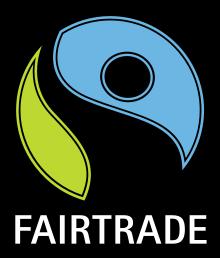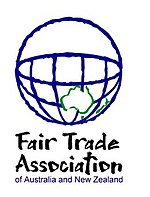
Fair trade is a term for an arrangement designed to help producers in developing countries achieve sustainable and equitable trade relationships. The fair trade movement combines the payment of higher prices to exporters with improved social and environmental standards. The movement focuses in particular on commodities, or products that are typically exported from developing countries to developed countries but is also used in domestic markets, most notably for handicrafts, coffee, cocoa, wine, sugar, fruit, flowers and gold.

Fairtrade International, or Fairtrade Labelling Organizations International E.V. is a product-oriented multistakeholder group aimed at promoting the lives of farmers and workers through trade. Fairtrade's work is guided by a global strategy focused on ensuring that all farmers earn a living income, and agricultural workers earn a living wage. Fairtrade works with farmers and workers of more than 300 commodities. The main products promoted under the Fairtrade label are coffee, cocoa, banana, flowers, tea, and sugar.

Worldshops, world shops or Fair Trade Shops are specialized retail outlets offering and promoting Fair Trade products. Worldshops also typically organize various educational Fair Trade activities and play an active role in trade justice and other North-South political campaigns.

The Fairtrade Foundation is a charity based in the United Kingdom that aims to help disadvantaged producers in developing countries by tackling injustice in conventional trade, in particular by promoting and licensing the Fairtrade Mark, a guarantee that products retailed in the UK have been produced in accordance with internationally agreed Fairtrade standards. The foundation is the British member of FLO International, which unites FLO-CERT, 25 National Fairtrade Organisations and 3 Producer Networks across Europe, Asia, Latin America, North America, Africa, Australia and New Zealand.

The World Fair Trade Organization (WFTO) is the global community and verifier of enterprises that fully practice Fair Trade. It is an association of SMEs, farmers or retailers that fully practice the 10 Principles of Fair Trade. They also advocate for fundamental change in our current economic system.
FLOCERT is one of the world’s leading social auditing and verification bodies and the global certifier for Fairtrade. With a vision of combating poverty and securing sustainable livelihoods for farmers in developing countries, FLOCERT's focus lies on auditing global supply chains and guaranteeing compliance with Fairtrade Standards.

The 'International Fairtrede Certification Mark is an independent certification mark used in over 69 countries. It appears on products as an independent guarantee that a product has been produced according to Fairtrade political standards.
FINE is an informal association of the four main fair trade networks: Fairtrade Labelling Organizations International (FLO), International Fair Trade Association, Network of European Worldshops (NEWS!) and European Fair Trade Association (EFTA) that was created in 1998.

Fairtrade Canada, formerly TransFair Canada, is a national non-profit certification and public education organization promoting Fairtrade certified products in Canada to improve the livelihood of developing world farmers and workers. It is the Canadian member of FLO International, which unites 24 fair trade producer and certification initiatives across Europe, Asia, Latin America, North America, Africa, Australia and New Zealand.

Association Max Havelaar France is the French member of FLO International, which unites 23 Fairtrade producer and labelling initiatives across Europe, Asia, Latin America, North America, Africa, Australia and New Zealand.
The European Fair Trade Association (EFTA) is a Dutch association established informally in 1987. It gained formal status in 1990. It regroups 11 fair trade importers in 9 European countries: Austria, Belgium, France, Germany, Italy, Netherlands, Spain, Switzerland and the United Kingdom. EFTA members include Ctm altromercato, Gepa3 Fair Handelshaus and Traidcraft. EFTA's aim is to support its member organizations in their work and encourage cooperation and coordination.

Fairtrade Ireland is the Irish member of FLO International, which unites 23 Fairtrade producer and labelling initiatives across Europe, Asia, Latin America, North America, Africa, Australia and New Zealand.
The fair trade movement has undergone several important changes like the operation for ten thousand villages to open their businesses since early days following World War II. Fair trade, first seen as a form of charity advocated by religious organizations, has radically changed in structure, philosophy and approach. The past fifty years have witnessed massive changes in the diversity of fair trade proponents, the products traded and their distribution networks.
The fair trade debate concerns the ethics and economic implications of fair trade, a term for an arrangement designed to help producers in developing countries achieve sustainable and equitable trade relationships. The benefits of fair trade for farmers and workers can vary considerably and the social transformation impacts also vary around the world. However the main concerns from critics is that fair trade may give an unfair advantage to some producers over others.

The Max Havelaar Foundation is a non-profit certification and public education organization promoting Fairtrade products in Switzerland to improve the livelihood of developing world farmers and workers. The Max Havelaar Foundation is the Swiss member of FLO International, which unites 23 Fairtrade producer and labelling initiatives across Europe, Asia, Latin America, North America, Africa, Australia and New Zealand. Several of these corresponding organizations in other European countries also use the Max Havelaar name. The Swiss Max Havelaar organization was founded in 1992 by the Third World aid organisations Brot für alle, Caritas, Fastenopfer, HEKS, Helvetas and Swissaid.
Shared Interest Society Limited is a fair trade financial co-operative based in the United Kingdom formed in 1990. Today it provides credit and financial services to fair trade producers, retailers, importers and exporters throughout the world. Shared Interest works with both Fairtrade International and the World Fair Trade Organization (WFTO). In 2004, the Shared Interest Foundation was formed as a charitable subsidiary, providing training and support services to producers, complementing the financial services offered by the Society. Shared Interest received the Queen's Award for Enterprise in 2008.

Fair trade coffee is coffee that is certified as having been produced to fair trade standards by fair trade organizations, which create trading partnerships that are based on dialogue, transparency and respect, with the goal of achieving greater equity in international trade. These partnerships contribute to sustainable development by offering better trading conditions to coffee bean farmers. Fair trade organizations support producers and sustainable environmental farming practices and prohibit child labor or forced labor.

A fair trade certification is a product certification within the market-based movement of fair trade. The most widely used fair trade certification is FLO International's, the International Fairtrade Certification Mark, used in Europe, Africa, Asia, Australia and New Zealand. Fair Trade Certified Mark is the North American equivalent of the International Fairtrade Certification Mark. As of January 2011, there were more than 1,000 companies certified by FLO International's certification and a further 1,000 or so certified by other ethical and fairtrade certification schemes around the world.
Fairtrade bananas was a marketing initiative which focused on increasing the price paid to small banana growers and the wages of agricultural workers. This is not a commercial brand, but a marketing strategy. Fair trade is based on higher prices paid by consumers that allow an equitable distribution of gains from trade over the chain partners.
Fair trade is where a farmer or craftsperson is paid a fair price for their product, one that represents its true worth, not just the lowest price that it is possible to pay. This is a price that covers the cost of production and enables the producer to live with dignity. Fair Trade New Zealand is an organisation that was launched in 2005 which supports fair trade by ensuring that farmers and workers' rights are not exploited. According to Oxfam New Zealand, there are several companies to support fairly traded goods from, which are exported to New Zealand. From 2013-2014 there were 42 Fair Trade Licensees and Traders in New Zealand. From 2015-2016 this number rose to 54 Fair Trade Licensees and Traders in New Zealand. Gwen Green, Oxfam's Engagement Director, says: "when farmers are paid fairly for their products, we see people able to make real improvements to their lives and their communities. Producers who used to struggle to feed their families are able to give their children an education, and communities can build schools and develop businesses. It is one of the smart solutions to poverty". In 2009, Wellington became the first fair trade capital city in the Southern Hemisphere. In 2017, Whangarei was recognised by the Fair Trade Association of Australia New Zealand as being one of four fair trade councils in New Zealand, and the first fair trade district in New Zealand.








